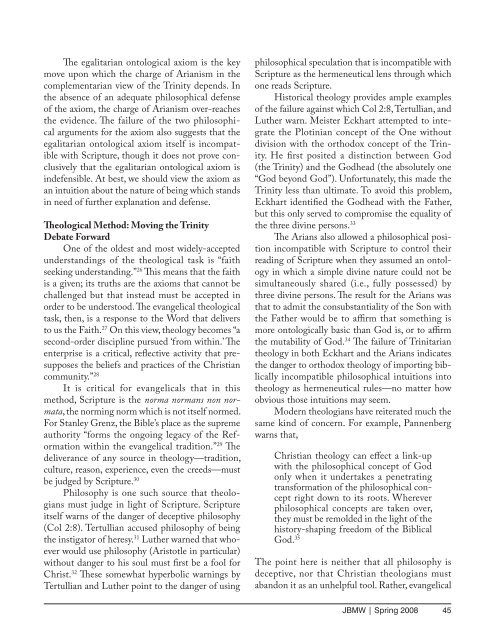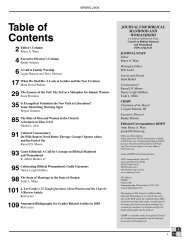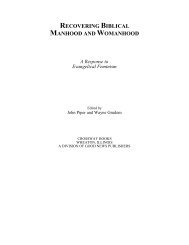<str<strong>on</strong>g>The</str<strong>on</strong>g> egalitarian <strong>on</strong>tological axiom is the keymove up<strong>on</strong> which the charge of Arianism in thecomplementarian view of the Trinity depends. Inthe absence of an adequate philosophical defenseof the axiom, the charge of Arianism over-reachesthe evidence. <str<strong>on</strong>g>The</str<strong>on</strong>g> failure of the two philosophicalarguments for the axiom also suggests that theegalitarian <strong>on</strong>tological axiom itself is incompatiblewith Scripture, though it does not prove c<strong>on</strong>clusivelythat the egalitarian <strong>on</strong>tological axiom isindefensible. At best, we should view the axiom asan intuiti<strong>on</strong> about the nature of being which st<strong>and</strong>sin need of further explanati<strong>on</strong> <strong>and</strong> defense.<str<strong>on</strong>g>The</str<strong>on</strong>g>ological Method: Moving the TrinityDebate ForwardOne of the oldest <strong>and</strong> most widely-acceptedunderst<strong>and</strong>ings of the theological task is “faithseeking underst<strong>and</strong>ing.” 26 This means that the faithis a given; its truths are the axioms that cannot bechallenged but that instead must be accepted inorder to be understood. <str<strong>on</strong>g>The</str<strong>on</strong>g> evangelical theologicaltask, then, is a resp<strong>on</strong>se to the Word that deliversto us the Faith. 27 On this view, theology becomes “asec<strong>on</strong>d-order discipline pursued ‘from within.’ <str<strong>on</strong>g>The</str<strong>on</strong>g>enterprise is a critical, reflective activity that presupposesthe beliefs <strong>and</strong> practices of the Christiancommunity.” 28It is critical for evangelicals that in thismethod, Scripture is the norma normans n<strong>on</strong> normata,the norming norm which is not itself normed.For Stanley Grenz, the Bible’s place as the supremeauthority “forms the <strong>on</strong>going legacy of the Reformati<strong>on</strong>within the evangelical traditi<strong>on</strong>.” 29 <str<strong>on</strong>g>The</str<strong>on</strong>g>deliverance of any source in theology—traditi<strong>on</strong>,culture, reas<strong>on</strong>, experience, even the creeds—mustbe judged by Scripture. 30Philosophy is <strong>on</strong>e such source that theologiansmust judge in light of Scripture. Scriptureitself warns of the danger of deceptive philosophy(Col 2:8). Tertullian accused philosophy of beingthe instigator of heresy. 31 Luther warned that whoeverwould use philosophy (Aristotle in particular)without danger to his soul must first be a fool forChrist. 32 <str<strong>on</strong>g>The</str<strong>on</strong>g>se somewhat hyperbolic warnings byTertullian <strong>and</strong> Luther point to the danger of usingphilosophical speculati<strong>on</strong> that is incompatible withScripture as the hermeneutical lens through which<strong>on</strong>e reads Scripture.Historical theology provides ample examplesof the failure against which Col 2:8, Tertullian, <strong>and</strong>Luther warn. Meister Eckhart attempted to integratethe Plotinian c<strong>on</strong>cept of the One withoutdivisi<strong>on</strong> with the orthodox c<strong>on</strong>cept of the Trinity.He first posited a distincti<strong>on</strong> between God(the Trinity) <strong>and</strong> the Godhead (the absolutely <strong>on</strong>e“God bey<strong>on</strong>d God”). Unfortunately, this made theTrinity less than ultimate. To avoid this problem,Eckhart identified the Godhead with the Father,but this <strong>on</strong>ly served to compromise the equality ofthe three divine pers<strong>on</strong>s. 33<str<strong>on</strong>g>The</str<strong>on</strong>g> Arians also allowed a philosophical positi<strong>on</strong>incompatible with Scripture to c<strong>on</strong>trol theirreading of Scripture when they assumed an <strong>on</strong>tologyin which a simple divine nature could not besimultaneously shared (i.e., fully possessed) bythree divine pers<strong>on</strong>s. <str<strong>on</strong>g>The</str<strong>on</strong>g> result for the Arians wasthat to admit the c<strong>on</strong>substantiality of the S<strong>on</strong> withthe Father would be to affirm that something ismore <strong>on</strong>tologically basic than God is, or to affirmthe mutability of God. 34 <str<strong>on</strong>g>The</str<strong>on</strong>g> failure of Trinitariantheology in both Eckhart <strong>and</strong> the Arians indicatesthe danger to orthodox theology of importing biblicallyincompatible philosophical intuiti<strong>on</strong>s intotheology as hermeneutical rules—no matter howobvious those intuiti<strong>on</strong>s may seem.Modern theologians have reiterated much thesame kind of c<strong>on</strong>cern. For example, Pannenbergwarns that,Christian theology can effect a link-upwith the philosophical c<strong>on</strong>cept of God<strong>on</strong>ly when it undertakes a penetratingtransformati<strong>on</strong> of the philosophical c<strong>on</strong>ceptright down to its roots. Whereverphilosophical c<strong>on</strong>cepts are taken over,they must be remolded in the light of thehistory-shaping freedom of the <strong>Biblical</strong>God. 35<str<strong>on</strong>g>The</str<strong>on</strong>g> point here is neither that all philosophy isdeceptive, nor that Christian theologians mustab<strong>and</strong><strong>on</strong> it as an unhelpful tool. Rather, evangelicalJBMW | Spring 2008 45
theology must judge any philosophical claim inlight of the biblical evidence, rejecting what is—c<strong>on</strong>trary to the faith, affirming that which iscompatible with it. 36<str<strong>on</strong>g>The</str<strong>on</strong>g> applicati<strong>on</strong> of this theological methodto the current Trinity debates am<strong>on</strong>g complementarians<strong>and</strong> egalitarians means that the egalitarian<strong>on</strong>tological axiom may not serve as an untestedpresuppositi<strong>on</strong> in the reading of Scripture. Presuppositi<strong>on</strong>lessreading of Scripture is not possible, ofcourse. However, the fact is that our presuppositi<strong>on</strong>s“tend to determine what we take from Scripture”<strong>and</strong> other texts. 37 As l<strong>on</strong>g as the compatibilityof the egalitarian <strong>on</strong>tological axiom with Scriptureis in questi<strong>on</strong>, that axiom may not also be used as ahermeneutical presuppositi<strong>on</strong> in reading the Scriptureor the traditi<strong>on</strong>. 38<str<strong>on</strong>g>The</str<strong>on</strong>g> supremacy of Scripture also determinesthe way in which the egalitarian <strong>on</strong>tological axiomcan be decisively invalidated. If complementarianscan show that the Scripture requires us to affirmthe functi<strong>on</strong>al/role/relati<strong>on</strong>al subordinati<strong>on</strong> of theS<strong>on</strong> to the Father al<strong>on</strong>gside the <strong>on</strong>tological equalityof the S<strong>on</strong> <strong>and</strong> the Father, then functi<strong>on</strong>al subordinati<strong>on</strong>cannot entail <strong>on</strong>tological subordinati<strong>on</strong>no matter how well reas<strong>on</strong>ed the philosophical casefor it. This does not render useless a well-reas<strong>on</strong>edphilosophical defense of the egalitarian axiom; sucha defense would serve to require a much str<strong>on</strong>ger<strong>and</strong> clear case for the functi<strong>on</strong>al subordinati<strong>on</strong> ofthe S<strong>on</strong> from Scripture than would otherwise benecessary.<str<strong>on</strong>g>The</str<strong>on</strong>g> way in which complementarians are makingtheir case attempts to paint egalitarians intoprecisely this corner. Kovach <strong>and</strong> Schemm haveoffered a brief two-pr<strong>on</strong>ged argument from Scripture.<str<strong>on</strong>g>The</str<strong>on</strong>g> first is that Scripture describes the S<strong>on</strong> asbeing eternally the S<strong>on</strong> of the Father, indicating asubordinate relati<strong>on</strong> to the Father. <str<strong>on</strong>g>The</str<strong>on</strong>g> sec<strong>on</strong>d isthat the S<strong>on</strong> is the “agent” through whom the Fatherworks. 39 Ware has argued that the Scripture indicatesthe eternal functi<strong>on</strong>al subordinati<strong>on</strong> of theS<strong>on</strong> to the Father through the names “Father” <strong>and</strong>“S<strong>on</strong>,” the Father’s authority over all things, <strong>and</strong>the submissi<strong>on</strong> of S<strong>on</strong> to the Father in the S<strong>on</strong>’smissi<strong>on</strong>. 40 He has also argued that Scripture providesevidence of the submissi<strong>on</strong> of the S<strong>on</strong> to theFather in eternity-past <strong>and</strong> eternity-future. 41 Additi<strong>on</strong>ally,Ware <strong>and</strong> Grudem have made a broad casefrom the Church Fathers that a reading of Scripturethat affirms some sense of m<strong>on</strong>archia uniqueto the Father is c<strong>on</strong>sistent with the Nicene faith,specifically, <strong>and</strong> the traditi<strong>on</strong>, generally. 42Complementarians can strengthen their casefurther by taking greater care to be both precise<strong>and</strong> c<strong>on</strong>sistent in their use of technical Trinitarianterms. Giles’s c<strong>on</strong>cern here should be a pointwell taken. Complementarians would benefit byproviding a well-developed, coherent philosophicaldescripti<strong>on</strong> of the <strong>on</strong>tology required by theirpositi<strong>on</strong>, <strong>and</strong> a rigorous philosophical critique ofthe egalitarian <strong>on</strong>tological axiom using the toolsof analytic philosophy. A more explicit defense ofthe Augustinian category of “relati<strong>on</strong>s” as a Trinitariancategory that does not make the S<strong>on</strong> lessa pers<strong>on</strong> or possessed of a lesser being than theFather, would serve to round out the categories oftechnical Trinitarian language described by Giles. 43Complementarians also need to provide a moreexplicit defense of their own key presuppositi<strong>on</strong>,“the ec<strong>on</strong>omic Trinity reveals the immanent Trinity,”<strong>and</strong> the way this principle functi<strong>on</strong>s in theirown reading of Scripture. 44Finally, it seems likely that egalitarians willbe unable to provide direct biblical warrant fortheir positi<strong>on</strong> that eternal functi<strong>on</strong>al subordinati<strong>on</strong>entails <strong>on</strong>tological subordinati<strong>on</strong>. However,under the theological method described in thisessay, it should be clear that it is not necessary forthem to do so! While a str<strong>on</strong>ger <strong>and</strong> more coherentdefense of the egalitarian <strong>on</strong>tological axiomwould strengthen their case, they need <strong>on</strong>ly showthat the Scripture does not require us to affirm thatthe S<strong>on</strong> is eternally functi<strong>on</strong>ally subordinate to theFather. A reading of the Fathers <strong>and</strong> the rest ofthe traditi<strong>on</strong>, which accounts for all of the relevantdata, including language about the m<strong>on</strong>archia of theFather <strong>and</strong> other counter-indicators, would alsostrengthen the egalitarian case that their reading ofScripture is c<strong>on</strong>sistent with the traditi<strong>on</strong>. In short,all that egalitarians lose by not presupposing their<strong>on</strong>tological axiom is the ability to rule out other-46 JBMW | Spring 2008




